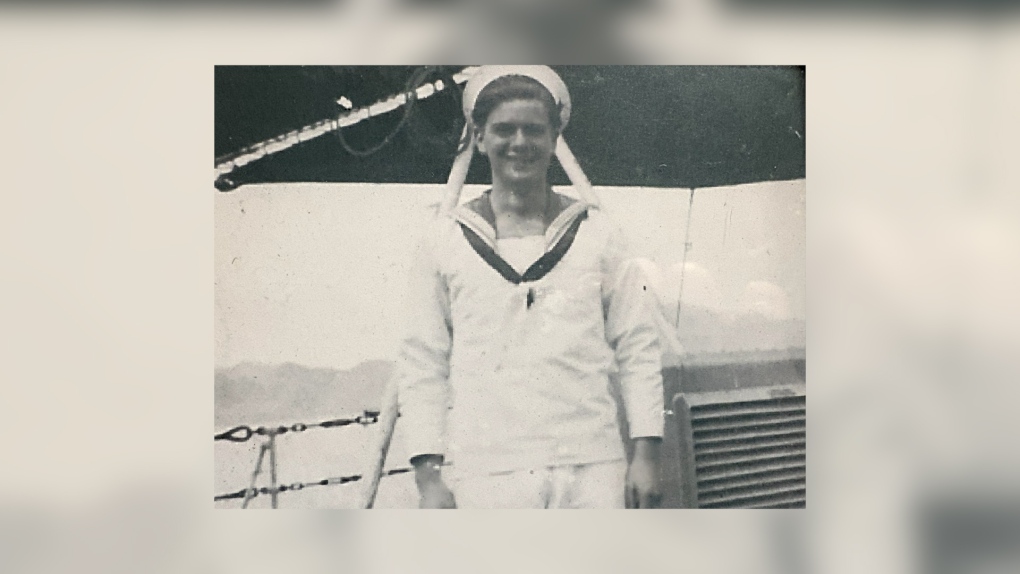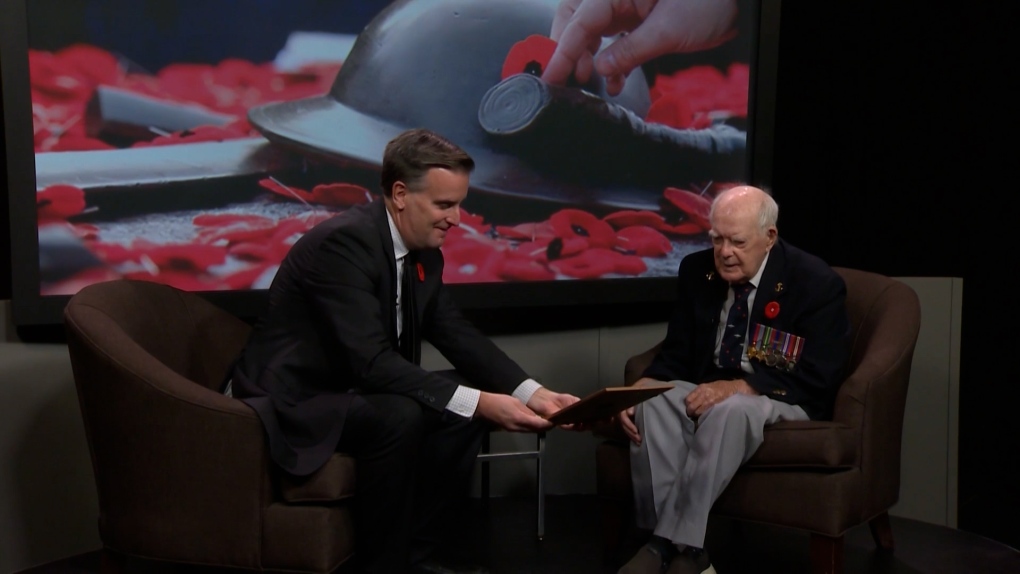Like many veterans of the Second World War, Allan Brunsden came to terms with his battle memories late in life.
At 99, he keeps his therapy dog ‘Bo’ close by in case his recollections get the better of him.
“The nighttime is worse. It is a bad time for me. I have a lot of flashbacks during the night,” he told CTV News.
For Allan, vivid memories of battle come from a long tour at sea in 1945. Combat was so intense that 18-year-old Alan penned a farewell note.
“So, I wrote a letter to my mother. I remember that clearly, and I told my mother I loved her and that I was afraid I was not going to return.”
Allan’s war-time story had begun long before he shipped out.
The Brantford-raised son of a wounded Great War veteran, enlisted in the Royal Canadian Navy in London, Ont. to avoid the fate of foot soldiers he had read about in the newspapers.
“There would be a picture of one of the servicemen that was killed. And every day I read about that. I think I decided that I didn’t want my picture in there. So, it seemed very seldom did I see pictures of Navy people. So, I decided I was going to join the Navy. “
 Allan Brunsden is seen in this photo dated 1945. (Source: Submitted)Allan would train on smaller ships on the west coast before being shipped east to serve on the HMCS Uganda. He was overwhelmed by its size.
Allan Brunsden is seen in this photo dated 1945. (Source: Submitted)Allan would train on smaller ships on the west coast before being shipped east to serve on the HMCS Uganda. He was overwhelmed by its size.
“They drove us to the waterfront there and they jumped and, and they said, ‘There’s a ship you’re going to. I looked at it and, I said, “That’s a bloody battleship!”
The Uganda would steam to northern Scotland before turning around and heading south.
At sea, Allan and the crew were told the destination – Imperial Japan.
They would arrive in April of 1945. Attached to the British Pacific Fleet, the Uganda would be the only Canadian warship to participate in the final battle with the Empire of the Sun.
“We put every confidence in our ship. We thought that we were invincible,” Allan recalled.
As the war in Europe ended Allan’s war was only beginning.
The crew of the heavily overcrowded Uganda would not wait long to see the enemy. Japanese pilots on a one-way trip, attacked the largely American fleet comprised of hundreds of ships — Uganda was not spared.
One morning, two kamikaze pilots had Allan’s position on deck in their final flight crosshairs, he described with shaking hands nearly 80 years after it happened.
“I can recall two kamikaze planes coming at us. I was on fire control Amidship, and this one plane was coming towards us, but suddenly, at the last minute, it veered away.”
 Sean Irvine (L) speaks with Second World War veteran Allan Brunsden in November 2024. (CTV News file image)The planes had turned for larger ships where allied lives were lost.
Sean Irvine (L) speaks with Second World War veteran Allan Brunsden in November 2024. (CTV News file image)The planes had turned for larger ships where allied lives were lost.
Allan survived to witness farewells at sea.
“When we had to bury people at sea. This was so upsetting to me. And although I was not on the burial party, I was standing up on the upper deck, and I watched them take the coffin. It wasn’t a coffin. It was just a board with his hammock wrapped around them. And it slid down off the quarterdeck. And that was so upsetting to me. “
Eight decades later, that upset has never left Allan. “I keep thinking about them, and you know, I think too much about them, and it’s upsetting to me, and I, I try to put it out of my mind, but it’s impossible,” he said.
You can see more on Allan’s emotional story in a two-part series on CTV News at 6, on Nov. 6 and 7.








